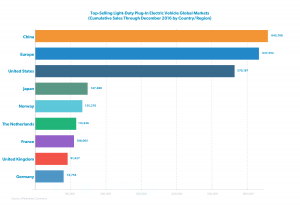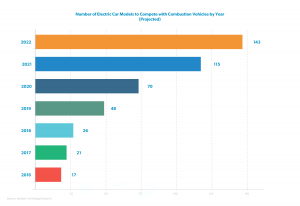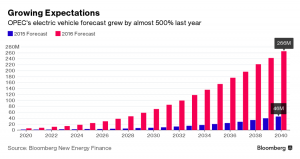Globally, the number of electric vehicles on the road in 2016 was 2 million, according to the International Energy Agency (IEA). China, Europe and the United States make up the three main markets, totaling more than 90 percent of all electric vehicles sold. China alone accounted for over 40 percent of the electric vehicles sold in 2016—and more than twice the volume sold in the United States—due to its lucrative subsidies and large population. In Europe, Norway had the highest share of the electric vehicle market at 29 percent, followed by the Netherlands with 6.4 percent and Sweden with 3.4 percent. Electric vehicles still made up only 0.2 percent of passenger light-duty vehicles on the roads of the world in 2016. According to the IEA, in order to limit temperature increases to below 2°C by the end of the century, the number of electric cars will need to reach 600 million by 2040—a factor increase of 300.[i]
Source:https://upload.wikimedia.org/wikipedia/commons/b/be/Top_PEV_global_markets_stock_Dec_2016.png
European countries are calling for a ban on the sale of combustion-engine vehicles—Norway by 2025 and France and Britain by 2040. However, while these countries have touted the bans, they have not yet legislated them. Unless the majority of their consumers prefer electric vehicles in the future, it is unlikely that they will implement these laws because subsidizing them is expensive. For electric vehicles to claim that much market share, they need to at least match the driving range of combustion vehicles, and their refueling time needs to be greatly reduced to nearly mimic the time it takes to refuel a combustion-engine vehicle. Further, a huge increase in electric vehicles would require many thousands of new charging stations, an upgrade in generating capacity, improved batteries and new sources of government income to replace lucrative fuel taxes that European governments receive from purchases of gasoline and diesel.
Bans on Combustion-Engine Vehicles
Norway, which has the highest penetration of electric cars in the world, has a target of only allowing sales of 100 percent electric or plug-in hybrid cars by 2025. About 40 percent of all cars sold in Norway last year were electric or hybrid vehicles due to its substantive package of incentives, which includes exemptions or reductions in taxes, no charges on toll roads or ferries, free municipal parking and access to bus lanes.[ii] Norway’s vast hydroelectric power system provides the majority of electricity for charging its electric vehicles.
Because France gets most of its electricity from nuclear power, it sees a ban in 2040 on gasoline and diesel vehicles as a way for the country to meet its commitments to the Paris accord.[iii] Britain’s new clean air strategy has sales of new gasoline and diesel cars and vans ending by 2040 and is making 255 million pounds ($332 million) available for local governments to take short-term actions like retrofitting buses.[iv]
Besides Norway, France and the UK, Austria, China, Denmark, Germany, Ireland, Japan, the Netherlands, Portugal, Korea and Spain have targets for electric car sales and some are considering banning gasoline and diesel vehicles.[v] The Netherlands has a motion to ban diesel and gasoline cars by 2025.[vi] India is considering no longer selling gasoline or diesel cars by 2030.[vii]
Auto Manufacturers Are Supporting the Electric Vehicle Market
Auto manufacturers are taking the electric vehicle market seriously. Volvo has announced plans to go all electric. The company’s long-term plan is to transition to three fully electric cars between 2019 and 2021, although sales of older pre-2019 gasoline vehicles could extend out to 2025. Volvo, which is owned by China’s Geely, plans to sell 1 million electric or hybrid cars globally by 2025. It is the only major automaker other than Tesla to make the 100 percent commitment to electric vehicles.[viii]
Toyota has a goal for all of its vehicles to be zero emission by 2050 and has favored electric vehicles for short-distance commuting.[ix] The company is in the production engineering stage of building a solid-state battery that will improve on the weight and range of the lithium-ion battery and possibly on the charging time.
Because it takes 4 to 5 years to design and develop a new car, many automakers began planning for electric vehicles in 2014 to debut by 2019, upping the model availability by almost a factor of three in the five-year period. By 2022, 143 models of electric vehicles are expected to compete with combustion-engine vehicles.[x] (See the chart below.)
Companies Upping Their Electric Vehicle Forecast
The IEA more than doubled its forecast for electric vehicles, increasing it to 58 million in 2030 from 23 million.[xi]
Oil producing companies have also increased their electric vehicle forecasts. Exxon Mobil expects electric vehicles to reach about 100 million in 2040 from a previous forecast of about 65 million. BP expects 100 million electric vehicles on the road by 2035—a 40 percent increase compared with a year ago.
The Organization of Petroleum Exporting Countries (OPEC) increased its forecast for sales of plug-in electric vehicles by more than a factor of five. OPEC raised its electric vehicle forecast to 266 million in 2040 from 46 million in last year’s forecast. (See graph below.) Electric vehicles are expected to account for 12 percent of the market within 23 years in OPEC’s new projection, compared to 2 percent in the prior year’s forecast. OPEC expects half the number of diesel vehicles in this year’s forecast, compared to last year’s forecast.
Bloomberg New Energy Finance expects electric cars to outsell gasoline and diesel models by 2040 based on a projected rapid decline in the cost of lithium-ion battery units. It expects 530 million plug-in cars on the road by 2040—about a third of the total number of cars worldwide. It also expects those cars to reduce oil demand by 8 million barrels by 2040. According to the agency, the world’s top automakers have a combined plan to sell 6 million electric vehicles a year by 2025, increasing to 8 million in 2030.
Consumers Will Decide the Fate of Electric Vehicles
Despite what these forecasters project, consumers will determine the future market for electric vehicles. If consumers find that electric vehicles are too costly, that they need recharging too frequently or that they are inconvenient due to a dearth of charging stations, they may decide that gasoline and diesel vehicles are a better buy. Electric vehicles still have range limitations, which can be more restrictive than manufacturers’ estimates. Because recharging stations are still too few to be available when needed, drivers must plan their trips around charging opportunities. Due to these factors, no more than 10 percent of consumers who consider purchasing an electric vehicle actually buy one.[xii]
If these forecasts are generally in the ballpark, there are still the long-term issues of whether the charging infrastructure will keep up with the number of vehicles and whether electric grids will be able to handle the additional demand. Further, if the mix of technologies in the generating sector does not change to zero emission technologies in concert with the growth in electric vehicles, the change will be for naught because the electricity that fuels the vehicles will be generated from technologies that emit carbon dioxide.
Conclusion
Consumers must be convinced that the combustion era is ending and electric is taking over for the bans on combustion vehicles to be effective. Otherwise, habits are unlikely to change. While financial incentives can help bring electric-vehicle prices closer to those of traditional vehicles, they are not enough for consumers to forfeit their traditional vehicles, given the limited driving range and lengthy charging time of electric vehicles.
[i] International Energy Agency, Electric vehicles have another record year, reaching 2 million cars in 2016, June 7, 2017, https://www.iea.org/newsroom/news/2017/june/electric-vehicles-have-another-record-year-reaching-2-million-cars-in-2016.html
[ii] Norwegian EV Policy, http://elbil.no/english/norwegian-ev-policy/
[iii] Guardian, France to ban sales of diesel and gas vehicles by 2040, July 6, 2017, https://www.theguardian.com/business/2017/jul/06/france-ban-petrol-diesel-cars-2040-emmanuel-macron-volvo
[iv] New York Times, Britain to Ban New Diesel and Gas Cars by 2040, July 26, 2017, https://www.nytimes.com/2017/07/26/world/europe/uk-diesel-petrol-emissions.html
[v] CNN Money, These countries want to ditch gas and diesel cars, July 26, 2017, http://money.cnn.com/2017/07/26/autos/countries-that-are-banning-gas-cars-for-electric/index.html
[vi] Netherlands moots electric car future with petrol and diesel ban by 2025, April 18, 2016, https://www.theguardian.com/technology/2016/apr/18/netherlands-parliament-electric-car-petrol-diesel-ban-by-2025
[vii] Times of India, India aiming for all-electric car fleet by 2030, petrol and diesel to be tanked, April 30, 2017, http://timesofindia.indiatimes.com/auto/miscellaneous/india-aiming-for-all-electric-car-fleet-by-2030-petrol-and-diesel-to-be-tanked/articleshow/58441171.cms India aiming for all-electric car fleet by 2030, petrol and diesel to be tankedIndia aiming for all-electric car fleet by 2030, petrol and diesel to be tankedIndia aiming for all-electric car fleet by 2030, petrol and diesel to be tanked
[viii] Seeking Alpha, Volvo draws notice with all-in EV commitment, July 5, 2017, https://seekingalpha.com/news/3277029-volvo-draws-notice-ev-commitment?dr=1#email_link
[ix] Reuters, Toyota takes stake in Mazda, links up for $1.6 billion U.S. plant, August 4, 2017, https://www.reuters.com/article/us-toyota-mazda-idUSKBN1AK0RF
[x] Seeking Alpha, Tesla Competition Watch: 143 Electric Car Models In The Market By 2022, July 10, 2017, https://seekingalpha.com/article/4086652-tesla-competition-watch-143-electric-car-models-market-2022?auth_param=1cqlaa:1cm76t4:c95930f8eeda23d72a967493e2ec001a&dr=1
[xi] Bloomberg, Big Oil Just Woke Up to Threat of Rising Electric Car Demand, July 14, 2017, https://www.bloomberg.com/news/articles/2017-07-14/big-oil-just-woke-up-to-the-threat-of-rising-electric-car-demand
[xii] National Post, Leonid Bershidsky: Killing fossil-fuel engines is easy. Make an electric car people actually want to drive, July 31, 2017, http://nationalpost.com/opinion/leonid-bershidsky-killing-fossil-fuel-engines-is-easy-make-an-electric-car-people-actually-want-to-drive/wcm/61958d66-fff8-4028-a11d-438114e7dfb9






